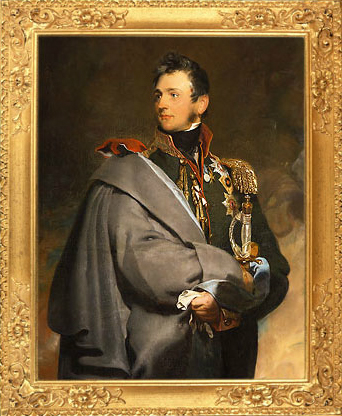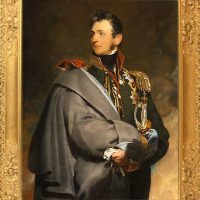Mikhail Semyonovich Worontsov
Mikhail Semyonovich Worontsov, Count, since 1852, His Serene Highness the Prince.
He was born on May 19, 1782. He comes from the ancient noble family of Worontsov.
His father was Count Semyon Romanovich Worontsov (1744-1832), a general from the infantry, a famous diplomat. Mother – Ekaterina Alekseevna, nee Senyavina (1763-1784). He spent his childhood and youth in London, where his father served as Minister Plenipotentiary (Russian ambassador). He received his education under the guidance of an enlightened father and with the help of the best home teachers and educators. At the age of 4, he was enlisted as a bombardier-corporal in the Preobrazhensky Regiment of the Life Guards. In September 1798, he was promoted from ensign to chamberlain of the Highest Court.
In 1801, M.S. Worontsov returned to his homeland and began military service as a lieutenant in the Life Guards of the Preobrazhensky Regiment. In the autumn of 1803, he volunteered for the Caucasus in the army of Prince P.D. Tsitsianov, in which he fought against the highlanders and Iranian troops. For the fearlessness shown during the capture of the Ganja fortress (December 2, 1803), Mikhail Semyonovich received his first military award – the Order of St. Nicholas. Anna of the 3rd degree. Then he was awarded the Orders of St. Vladimir of the 4th degree with a bow (in 1804) and St. George of the 4th degree (in 1805).
In 1805, M.S. Worontsov participated in the campaign to Hanover during the war with France, in 1806-1807 he fought with the French in Poland and East Prussia and for distinction at Pultusk (December 1806) was promoted to colonel (January 12, 1807), then appointed commander of the 1st battalion of the Life Guards of the Preobrazhensky Regiment. With this battalion, on May 24 and 25, 1807, he participated in the battles of Gutstatt, on May 29 — in fierce hand-to-hand combat near Geisberg, on July 2 – in the Battle of Friedland.

On September 30, 1809, Colonel M.S. Worontsov was appointed commander of the Narva Infantry Regiment. In the Danube Army, he participated in the fighting with the Turks. For bravery during the storming of Bazardzhik (May 1810), he was promoted to Major General. Sent with a special detachment to the Balkans, Mikhail Semenovich occupied the cities of Plevna, Lovech and Selvi, for which he was awarded the Order of St. Nicholas. Anna of the 1st degree. In the campaign of 1811, Worontsov participated in the battle of Ruschuk (for this victory he was awarded the Order of St. Vladimir Grand Cross of the 2nd degree), 4 cases near Kalafat and in a successful case near Viddin. For bravery and skillful organization of raids across the Danube, M.S. Vorontsov was awarded the Order of St. George, 3rd degree.
In the Patriotic War of 1812, M.S. Worontsov was the head of the combined grenadier division (as part of the 2nd Western Army), which bravely fought near Dashkov in the defense of Smolensk, steadfastly defended Bagration’s flushes in the Battle of Borodino, where Mikhail Semenovich was wounded by a bullet in the thigh. Upon recovery, while remaining the head of the same division, he was appointed to command the vanguard of the 3rd Army. For Borodino and other battles, M.S. Worontsov was awarded the Order of St. Nicholas. Anna with diamonds.

In the foreign campaigns of the Russian army of 1813-1814, he distinguished himself in a number of battles: at Gross-Beeren, Dennewitz (August 1813), Leipzig (October 1813), Kassel (November 1813), Craon (February 1814), in the capture of Paris (March 1815). In February 1813 Worontsov He received the rank of Lieutenant General. For Leipzig, M.S. Worontsov was awarded the Order of St. Alexander Nevsky, for Kraon he was awarded the Order of St. George, 2nd degree. From 1815 to 1818, M.S. Worontsov commanded the Russian occupation corps in France until 1818. In 1819, he was appointed commander of the 3rd Infantry Corps in Russia.
On May 7, 1823, Alexander I signed a decree appointing M.S. Worontsov as the Novorossiysk Governor-General and plenipotentiary governor of the Bessarabian region. Odessa becomes the main residence of the Governor-General, and M.S. Worontsov chooses Alupka on the Southern coast of Crimea as the place for a summer residence (M.S. Worontsov first visited Crimea in 1822 and began to acquire land here), where from 1824 to 1848 a magnificent palace and park ensemble was created, which remains an outstanding historical monument to this day and architecture.
In March 1825, M.S. Worontsov was promoted to general of the Infantry. Since 1826 – member of the State Council, honorary member of the St. Petersburg Academy of Sciences.
In 1828-1829 . Worontsov led the siege and capture of the Varna fortress; he was awarded a gold sword with diamonds. In 1836 he was appointed chief of the Narva Infantry Regiment.
In the managed regions, M.S. Worontsov carried out activities that contributed to the development of education, agriculture, industry, trade and shipping, and paid great attention to the development and improvement of Odessa.
In 1844-1854, M.S. Worontsov was both the governor and commander-in-chief of the troops in the Caucasus. There he took vigorous measures (both military and peaceful) to calm the rebellious mountain tribes. Despite his middle age, he personally participated in military campaigns and operations.
In August 1845, by decree of Emperor Nicholas 1, M.S. Worontsov was elevated, with descending descendants, to the princely dignity of the Russian Empire (for going to the village of Dargo, the residence of Shamil), and in March 1852 he received the title His Serene Highness the Prince. In October 1854, for health reasons, Vorontsov resigned, remaining a member of the State Council. On the day of the coronation of Emperor Alexander II on August 26, 1856, he was promoted to Field Marshal General.
In addition to these awards, M.S. Vorontsov was awarded: the Orders of St. Vladimir, 1st degree (1820), St. Andrew the Apostle (1829), etc., many foreign awards.
In 1819, M.S. Worontsov married Elizabeth Ksaverevna Branitskaya (1792-1880). In their marriage, 6 children were born, four of them died at an early age, only two survived to adulthood — Semyon (1823-1882) and Sophia (1825-1879).
M.S. Worontsov died in Odessa on November 6, 1856. He was buried in the Odessa Cathedral of the Transfiguration.

«He is Russian, he is your Son, therefore, he must have heroic courage; what a beautiful soul he has! Modesty is equal to valor in him. It is flattering to know him as a compatriot, it is an honor to serve with him and be grateful to him»
From a letter from F. V. Rostopchin to Count S.R. Worontsov
